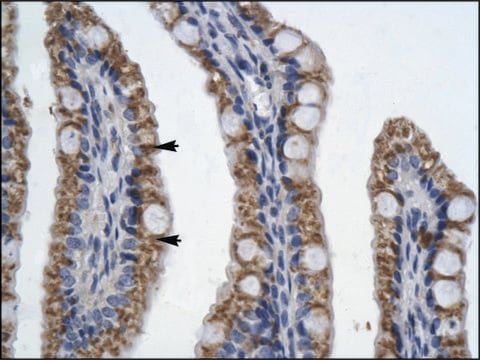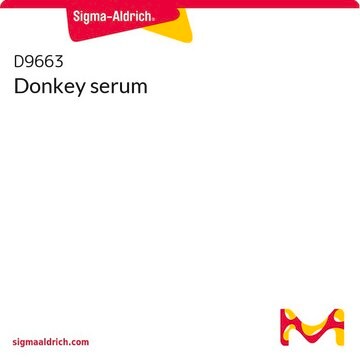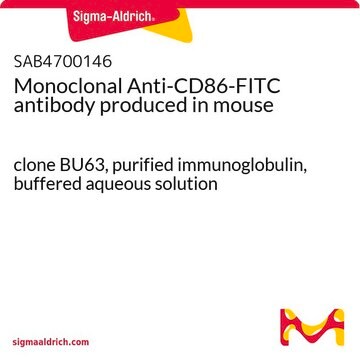MAB079-1
Anti-S-100 Protein Antibody, clone 15E2E2
clone 15E2E2, Chemicon®, from mouse
Synonyme(s) :
Calcium Binding Protein A1/B1
About This Item
Produits recommandés
Source biologique
mouse
Niveau de qualité
Forme d'anticorps
purified immunoglobulin
Type de produit anticorps
primary antibodies
Clone
15E2E2, monoclonal
Espèces réactives
bovine, rat, human, mouse
Fabricant/nom de marque
Chemicon®
Technique(s)
immunohistochemistry (formalin-fixed, paraffin-embedded sections): suitable
immunoprecipitation (IP): suitable
western blot: suitable
Isotype
IgG2aκ
Numéro d'accès NCBI
Numéro d'accès UniProt
Conditions d'expédition
wet ice
Modification post-traductionnelle de la cible
unmodified
Informations sur le gène
human ... S100A1(6271)
Description générale
Spécificité
Immunogène
Application
A previous lot of this antibody was used in IP.
Visualization of cellular and subcellular localization of S-100 protein using immunohistochemical techniques.
Immunohistochemistry:
A 1:100-200 dilution of a previous lot was used for paraffin embedded tissue sections.
Optimal working dilutions must be determined by end user.
Metabolism
Muscle Physiology
Qualité
Western Blot Analysis:
1:1000 dilution of this antibody detected S100 on 10 µg of PC12 lysate.
Forme physique
Stockage et stabilité
Remarque sur l'analyse
Positive Control Tissue: Melanoma
Autres remarques
Informations légales
Clause de non-responsabilité
Vous ne trouvez pas le bon produit ?
Essayez notre Outil de sélection de produits.
Code de la classe de stockage
12 - Non Combustible Liquids
Classe de danger pour l'eau (WGK)
WGK 2
Point d'éclair (°F)
Not applicable
Point d'éclair (°C)
Not applicable
Certificats d'analyse (COA)
Recherchez un Certificats d'analyse (COA) en saisissant le numéro de lot du produit. Les numéros de lot figurent sur l'étiquette du produit après les mots "Lot" ou "Batch".
Déjà en possession de ce produit ?
Retrouvez la documentation relative aux produits que vous avez récemment achetés dans la Bibliothèque de documents.
Notre équipe de scientifiques dispose d'une expérience dans tous les secteurs de la recherche, notamment en sciences de la vie, science des matériaux, synthèse chimique, chromatographie, analyse et dans de nombreux autres domaines..
Contacter notre Service technique







